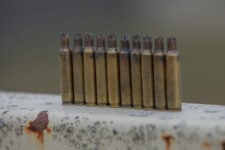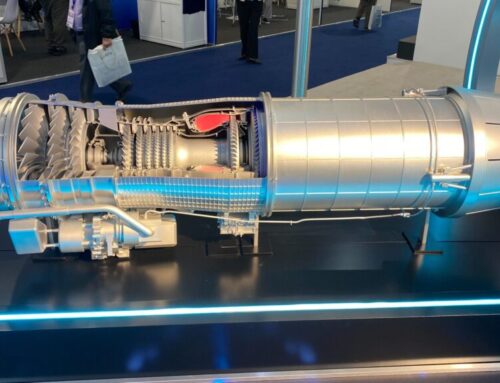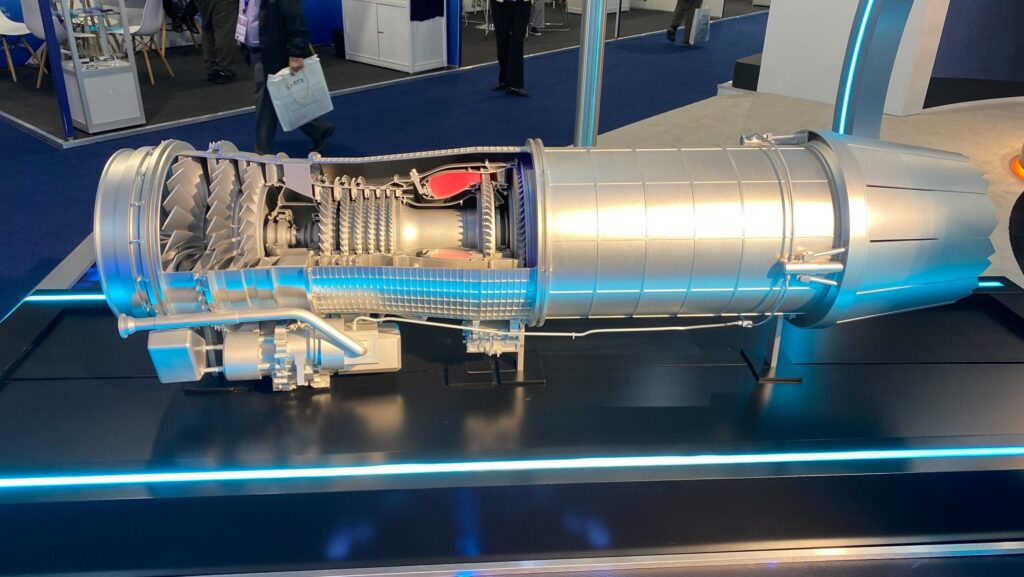A row of blank ammunition shells stand on a rail during the MOUT tunnels event on day four of the U.S. Army Reserve Best Squad Competition on Fort McCoy, Wisconsin, Sept. 6, 2023. (U.S. Army Reserve photo by Samantha Mussatti)
Much has been made about the supply chain for high-end American munitions, but the same issues plague the most basic of America’s armaments: the ammunition used by US forces. In this op-ed, retired Maj. Gen. James Marks calls for Congress to support initiatives that will ensure a supply of a key component for US ammunition suppliers.
When an American soldier is under fire, or preferably bringing fire on our enemies, the last thing he or she ever worries about is whether their ammo will actually work. Certainly, in the field I always assumed my ammunition and weapons systems would function as expected. In modern warfare, combatant commanders do not question the sufficiency of the force’s firepower at the individual soldier level to ensure victory.
The United States has long held a position of military supremacy and international leadership because of wise investments in our weaponry, arsenal, and capabilities. But the movement of manufacturing outside of our borders, the expansion of supply chains, and strategic maneuvering by foreign adversaries have strained US access to critical ammunitions components — including nitrocellulose, or “guncotton,” a key production material for gunpowder and munitions propellants.
Control of nitrocellulose production could shape the geo-military landscape well into the future, and the US is now playing catch up. Action is needed, as quickly as legislation can be passed.
China is now the largest producer of guncotton. Its stronghold on the market has been reinforced by the Russia-Ukraine war, which has depleted supplies and exposed arms-stock shortages across the West. The Chinese government’s production advantage has allowed it to prop up the Russian military, and some argue the West’s reticence to support Ukraine similarly has tipped the scales in Russia’s favor.
While I disagree with the latter and believe the Ukrainians will prevail, it is impossible to ignore the impact China has had and could continue to have—not only in Ukraine, but also in the next theater of war. The Financial Times reported recently that Russian nitrocellulose imports from China more than doubled last year, from $3.4 million in 2022 to $7.18 million through the first 10 months of 2023. That undoubtedly has prolonged Russia’s war effort.
Despite strict international sanctions and the obvious alignment of national security imperatives, several nitrocellulose manufacturers have, unbelievably, also aided Russia. Total Russian imports increased 70 percent in 2022, the first year of its attack on Ukraine, and by mid-last year had nearly doubled 2021 levels. These gains, only achievable through third-countries’ ramp-up of production and supply, came amid NATO shortages and directly contradict aid efforts to Ukraine. At least on the surface, they appear to violate international law.
US policymakers must prioritize nitrocellulose production and munitions inputs if we hope to maintain our military superiority and our ability to support our allies. The challenge is two-fold: First, to bolster domestic production and, secondly, to shore up export controls. Both require improved production here at home.
To the first point, this year Sen. Jim Risch, R-Idaho, and Rep. Tom Emmer, R-Minn., introduced the Ammunition Supply Chain Act. This legislation would require the Executive Branch to report to Congress on domestic smokeless gunpowder supplies, including nitrocellulose — an important first step to understanding US production capabilities and what’s necessary to enhance them. Congress should take up the Act and make sure it passes in this legislative calendar.
American manufacturers are able and willing to support these efforts. Jason Vanderbrink, co-CEO of Vista Outdoor, the world’s largest ammunitions maker, put it succinctly: “The ammunition market depends on a robust supply of nitrocellulose,” and “global strain on supply threatens freedom and impacts those who protect and serve.” Lawmakers should continue to partner with and support these US producers if we hope to gain the upper hand.
For its part, the Biden administration has stepped up export controls on nitrocellulose. In December, the Treasury Department announced a new round of sanctions to “tighten the vice” on third-countries that supply Russia’s military-industrial base. This is the right start, but here again, the best defense is a good offense. Preventing foreign countries from exporting highly sought-after ammunition inputs is both difficult to enforce and will likely have little effect. It’s a lot harder to control foreign companies than it is domestic ones. The US has a lot more say-so when we dominate supply.
Nothing focuses the mind like a threat. A silver-lining of the Russia-Ukraine conflict is that it has shined a light on the urgent need to strengthen domestic production of critical ammunition components and secure our supply chains. To be sure, the situation is a canary in the coal mine. No one knows when or where the next major geo-military conflict will emerge. There’s a good chance it could involve US troops.
It is imperative our forces are equipped to protect freedom of liberty around the world — and that starts here at home. Pray for peace and pass the ammunition. Let’s ensure we can do both.
Major General Marks (Ret.) is an on-air national security, military, and intelligence contributor to CNN and a member of the Military Intelligence Hall of Fame.






![The sights from the 2024 Farnborough Airshow [PHOTOS]](https://centurionpartnersgroup.com/wp-content/uploads/2024/07/IMG_8722-scaled-e1721930652747-1024x577-hZjwVb-500x383.jpeg)




